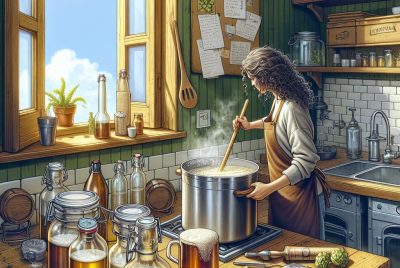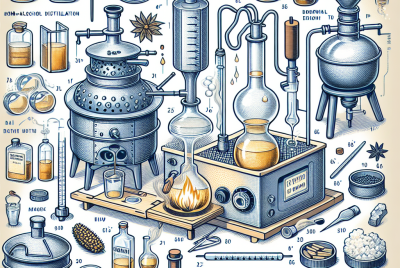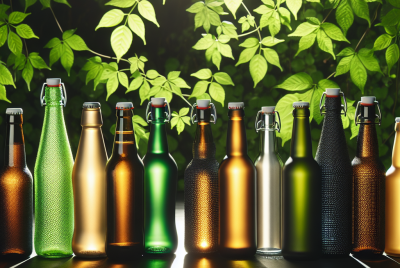Home Distilling – An Introduction
Have you ever found yourself yearning for a hobby that is both art and science? Have you done home brewing for a while and want to get even more creative and adventurous? Welcome to the world of home distilling, where patience, craftsmanship, and a dash of daring can create liquid gold. As a home distiller myself, I can vouch for the satisfaction it brings.
The Art of Home Distilling: A Brief History
Home distilling is as old as civilization itself. It dates back to ancient times when humans first discovered the intoxicating effect of fermented fruits. Over centuries, the process was refined and distilled spirits were born. Now, you too can partake in this age-old craft.
Why Home Distilling?
So, you might ask, “Why should I venture into home distilling?” Let’s see why.
The Joy of Craftsmanship
The essence of home distilling is the joy of craftsmanship. It’s like cooking your favorite dish from scratch—you have control over the ingredients, process, and the final outcome. Plus, the end result is a bottle of spirit that’s unique to you.
Cost-Effectiveness
While setting up a home distillery requires some initial investment, over time, it can be more cost-effective than buying commercial spirits.
Customization and Experimentation
As a home distiller, you can experiment with different recipes, grains, fruits, and aging processes. The opportunities for customization are boundless.
Understanding The Basic Equipment for Home Distilling
For any aspiring home distiller, it’s essential to understand the basic equipment required for the process.
The Distillation Unit
At the heart of home distilling is the distillation unit, also known as the still. A still is a vessel where your fermented mixture is heated to separate the alcohol.
Fermentation Vessels
These are containers where the magic of fermentation happens.
Thermometers and Hydrometers
Essential tools for monitoring temperature and alcohol content during the process.
Importance of Quality Equipment
Remember, the quality of your equipment greatly influences the quality of your spirit. It’s a one-time investment that pays off in the long run.
The Home Distilling Process
Now that we’ve covered the why and what of home distilling, let’s dive into the how.
Fermentation
The process begins with fermentation. You mix your chosen ingredients (grains or fruits) with water and yeast. The yeast consumes the sugars, producing alcohol and carbon dioxide.
Distillation
The next step is distillation. You transfer the fermented mixture to your still and apply heat. The alcohol, which evaporates at a lower temperature than water, rises as vapor, condenses, and is collected.
Aging and Bottling
Finally, you age the distilled spirit in a suitable container, often an oak barrel. Aging helps to enhance the flavor profile. After the desired aging period, you bottle your spirit, ready for savoring.
Key Safety Considerations for Home Distillers
As rewarding as home distilling can be, it’s crucial to prioritize safety. Always ensure your equipment is in good condition and correctly installed. Keep your workspace clean and free from flammable materials. And remember, always distill responsibly.
Legal Aspects of Home Distilling
Before you dive headfirst into home distilling, do your homework on the legal aspects. The laws vary significantly from country to country and even state to state. It’s essential to ensure your new hobby doesn’t cross any legal boundaries.
Top Tips for Aspiring Home Distillers
Ready to get started? Here are a few tips:
- Start simple: Don’t dive into complicated recipes right away. Start with a basic recipe and gradually experiment.
- Patience is key: Distilling is an art that can’t be rushed.
- Join a community: Connect with other home distillers for advice and shared experiences.
Troubleshooting Common Issues in Home Distilling
Every new hobby comes with its set of challenges. Here’s a quick troubleshooting guide:
- Low yield? Check your fermentation process and ensure your yeast is healthy.
- Off flavors? It could be an issue with your raw materials or contamination.
Exploring Different Recipes and Spirits
Once you’ve mastered the basics, the world of spirits is your oyster. From whiskey to rum, from gin to vodka, you can create them all in your home distillery.
Conclusion
There you have it, a comprehensive guide to home distilling. As a home distiller, there’s nothing quite like the thrill of pouring a glass of your own spirit. In my case it’s usually whiskey. So, why wait? Embrace the art of home distilling and start crafting your unique spirits today.
Frequently Asked Questions
1. Is home distilling safe?
Yes, when done correctly and responsibly, home distilling is safe.
2. Can I sell the spirits I make at home?
Most jurisdictions prohibit the sale of homemade spirits without a commercial distiller’s license.
3. How long does it take to distill spirits at home?
The fermentation process usually takes a week or two, while the distillation can be completed in a day.
4. What’s the best spirit to start with for a novice home distiller?
Many beginners start with a simple sugar wash distillate or a fruit brandy.
5. Can I flavor my homemade spirits?
Absolutely! You can experiment with different flavors during the fermentation or aging process.




